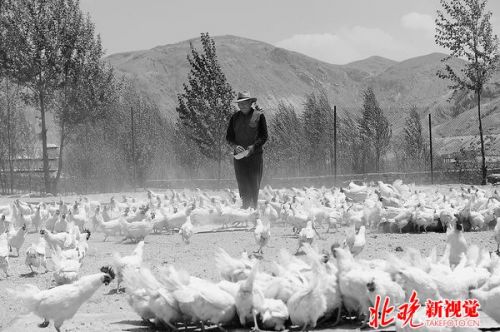Beijingers are expected to eat Nimu Tibetan eggs next year.

Tibetan chicken
"raising Tibetan chickens is only a habit of the people, and no one thought of getting rich with it."
Research month to find the way to get rich
In July 2013, Peng Songtao went to Nimu County, Lhasa. "Nimu" translated into Chinese is wheat ear, implying a bumper harvest, but Nimu at that time had nothing to do with it. "at that time, Nimu was poorer than one of our poorest villages." Peng Songtao calculated that in Fengtaihua Township in Beijing, the poorest village at that time had an income of at least 40 million yuan a year, while Nimu, as a county, had only 21 million yuan. This is the undisputed bottom in the 6 counties and 2 districts of Lhasa.
"first we need to know where Nimu is poor and whether he has a chance to get rich." After more than three months of research, Peng Songtao found that the whole Nimu is nothing but mountains and ditches, and the per capita arable land is less than one mu, so it is too unrealistic to get rich by planting. But the advantage is also among them, the air is good, the soil, water is pure, engage in breeding is a very good direction.
Then Peng Songtao quickly locked in the Tibetan chicken farming industry, because almost every household in Nimu raised Tibetan chickens, at least 20 to more than hundreds, and the state still had subsidies for buying chicken seedlings, and there was a basis for the development of Tibetan chicken farming. Although the Tibetan chicken is small, the meat is good, and the nutritional value of eggs is also very high, so there is no market.
"but later I learned that raising Tibetan chickens is only a habit of the people, and no one wants to get rich with it." When it is cold, Peng Songtao goes to the village to investigate and find the Tibetan chicken is not so easy. Upon inquiry, I realized that the Tibetan chicken laid very few eggs, each laying only 60 eggs a year, and it stopped laying eggs after October. For the people who are not well-off, it is undoubtedly a burden to eat chicken without work in winter, so it is neglected to manage it, so that for so many years, Tibetan chicken has not become a local climate.
Peng Songtao
"We have to give everyone a complete industrial chain to let Tibetan eggs get out of Nimu."
Now there is a prospect for Tibetan chickens to come to Beijing.
"if you want to improve the enthusiasm of the people to raise Tibetan chickens, you can't just rely on slogans. You have to have something real!" Peng Songtao said that it is necessary to give everyone a complete industrial chain to let Tibetan eggs go out of Nimu. At the beginning of the preparatory work, Peng Songtao exchanged views with the fourth group of Tibetan aid cadres and learned that there is a large-scale chicken farm in Dilong Deqing County, Lhasa, which is a good reference.
Then Peng Songtao and the Tibetan aid cadres in the class talked about an enterprise locally, and the industrial chain also had an initial structure. When the time was ripe, Peng Songtao also set his sights on a larger market-Beijing. Since 2014, Peng Songtao and his colleagues have found Beijing Deqingyuan Agricultural Science and Technology Co., Ltd., and initially reached an intention to cooperate. The general direction is that Deqingyuan will provide Tibetan chicken seedlings, and farmers will be responsible for raising them. Nimu County government is responsible for recycling eggs and broilers. In 2015, Nimu and Deqingyuan began to sign a cooperation agreement. With the intervention of Beijing enterprises, the entry of Nimu Tibetan chickens into Beijing began to take shape.
Last week, the reporter came to Nimu County and saw that the construction of the chicken house in Deqingyuan has begun. The project is divided into three phases, and the first phase is nearing completion. The builders told reporters that after the completion of the first phase of the project, the henhouse can hold about 7000 sets of Tibetan chickens (7000 hens with the right number of cocks).
Peng Songtao said that by 2017, when Nimu's Tibetan chicken industry really takes shape, we Beijingers will be able to eat Nimu's Tibetan eggs. "at that time, I have already returned to Beijing, but I can still eat Tibetan eggs from my hometown." it's a particularly gratifying thing to think about. " During the conversation, Peng Songtao seems to have regarded Nimu as his second hometown. "if you take care of it as your own home, you can bring real benefits to the people."
The income of poor households increased significantly after raising Tibetan chickens in Tudan Zaxi.
"now farmers in Nimu County are all moved, and the number of cooperatives has grown to six."
The considerable income in the future will tempt more farmers.
A complete industrial chain is ready, but the real main body must be the chicken farmers in Nimu. It is always the most difficult to start. At first, Peng Songtao was not fully sure whether everyone's enthusiasm could be mobilized. Judging from the local situation, there must be several successful models for people to see in order to achieve the leap from scratch.
"Secretary Peng, can I try raising Tibetan chickens?" Farmers in Tonba Township, Nimu County, are off to a good start. Compared with ordinary local farmers, Gatso's vision is much broader. He has seen the way to get rich in the Tibetan incense industry before. This time, he has taken the initiative to apply for the establishment of a Tibetan chicken farming cooperative, so it is not only himself. It can also lead nine poor families around to get rich together. Peng Songtao said that Gatso's cooperative earns more than 40,000 yuan a year by raising Tibetan chickens, and his cooperative has also been rated as an advanced cooperative.
"now farmers in Nimu County are all moved, and the number of cooperatives has grown to six!" On the question of enthusiasm, Peng Songtao was finally not so anxious. Last week, Peng Songtao took reporters to a local Tibetan chicken farming cooperative. As soon as the iron gate of the yard opened, nearly a thousand chickens scattered in the yard could be seen everywhere, which looked like snow from a distance. The owner of the cooperative is Tudan Zaxi, a local farmer, who told reporters through an interpreter that he once earned only 4000 yuan a year by farming, but now he raises Tibetan chickens with several poor families, and it is conservatively estimated that his annual income can reach more than 30, 000 yuan. "the cost of a chicken chick is 42 yuan, but I only pay 5 yuan myself, and the rest is subsidized by the policy, so it's a good time!" Peng Songtao said that the reason why chicken farmers are allowed to pay 5 yuan by themselves is to raise their cost awareness.
When the reporter asked Tudan Tashi if he had ever thought of selling eggs to Beijing, he kept nodding with a simple and honest smile on his face.
Related
- A course of planting techniques and methods on how to grow carrots
- How to plant the latest tulips?
- Is it better to pick tea in the morning or in the afternoon? When is the best time for tea to be picked? what is the third or fifth tea?
- Launch Yuanxiao Happy combination Haocha + Tea Yuan healthy Taste
- Penghu Tourism "Fireworks 20 Parade with You"
- 2022 West Lake Happiness holds "Digital Revitalization Voucher" and draws iphone13 and laptop.
- Banqiao Fuzhou social houses are designed to change start-up combined with police elimination to create a safe and livable environment
- The convenient measure of "mechanical weeding" in Xinbei has been abused and the Agriculture Bureau has imposed heavy penalties on the illegal land consolidation.
- Changgeng University Joins Hands with Four Memory Factories to Rescue Memory Talent Shortage
- The list of Taiwan's top 100 MVP managers is listed by the Director-General of the Farmers' Association of Sanxia District.



